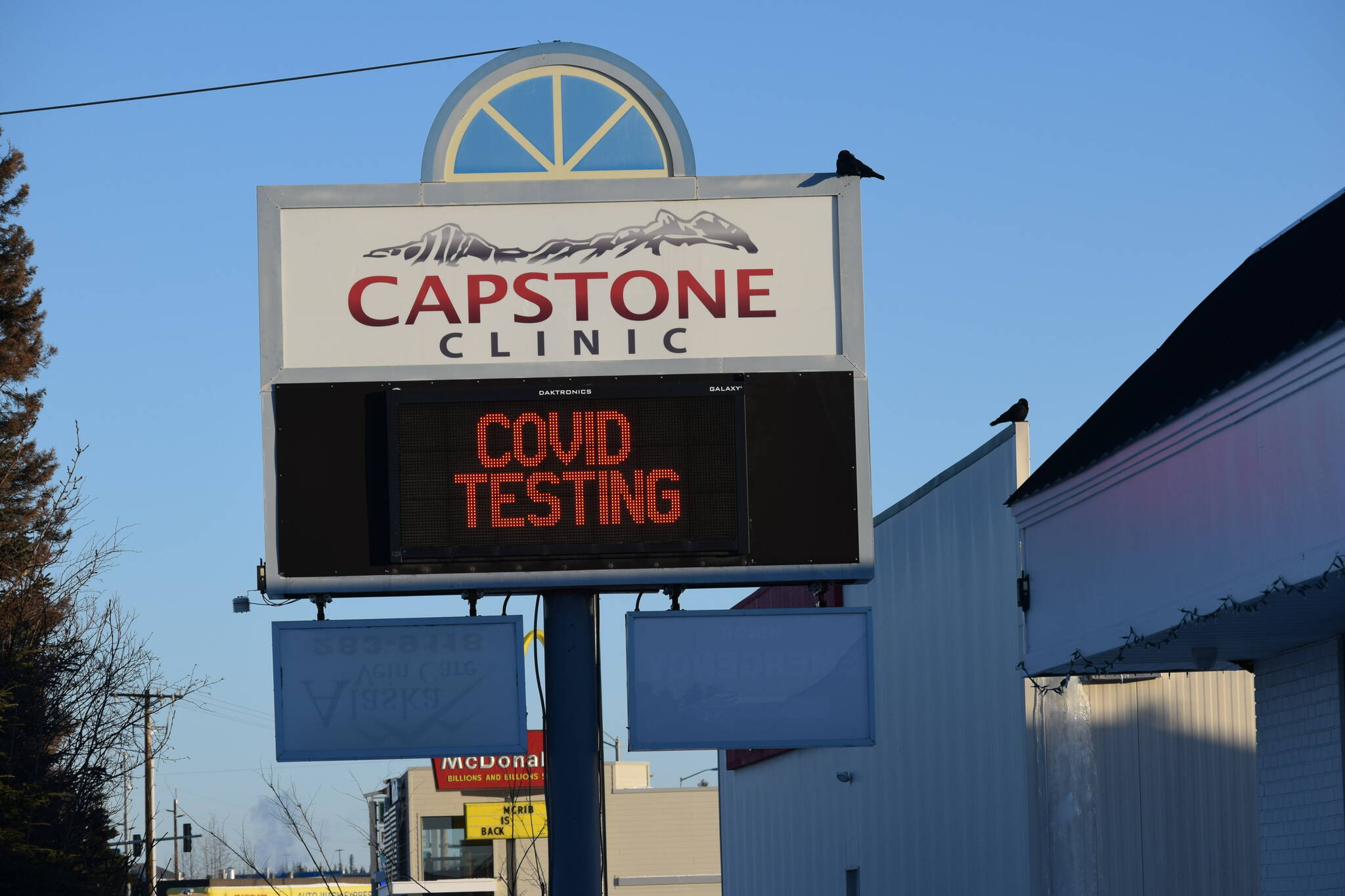Health care providers in Alaska are bracing for what’s looking like another wave of COVID-19, as the omicron variant circulates the country.
According to state data, there was a 145% increase in COVID cases from the week of Dec. 22 to the week of Dec. 29, marking a substantial uptick after weeks of decline.
State health experts said Wednesday during a public health session that the sharp increase in COVID positives has correlated to more demand for testing materials.
Chief Medical Officer Dr. Anne Zink said some Alaska providers are already seeing testing shortages.
Locally, however, testing sites have enough materials for the time being.
Justin Ruffridge, the owner of Soldotna Professional Pharmacy, said Wednesday that the clinic still has a sufficient supply of tests, and encouraged people to continue closely monitoring symptoms.
“We were pretty well-supplied leading into this,” Ruffridge said. “We probably have a good month’s worth on hand.”
He said the pharmacy is preparing for another COVID wave.
“I think it just means we’re going to get hit hard and fast, and just to sort of prepare for disruptions in everyday life,” Ruffridge said of the newly sequenced omicron cases. “There’s going to be a lot of people out sick, pretty much.”
Dr. Joe McLaughlin, the state epidemiologist, said during Wednesday’s session that studies are still suggesting the omicron strain is causing less severe illness.
“I just want to take this opportunity to underscore the fact that across the globe, what we’ve seen with omicron is lower hospitalization and death rates in general,” he said. “So I want people to know that is what we’re seeing practically.”
Health experts reiterated Wednesday the importance of remaining diligent about using mitigation measures — including vaccination, social distancing and masking — to prepare for another increase in COVID cases.
They also emphasized the availability of at-home tests.
Dr. Coleman Cutchins, a clinical pharmacist with the state Department of Health and Social Services, advised vaccinated folks with a robust immune system and mild symptoms to use at-home options, as well as people testing for travel.
Other people, for other reasons, might prefer to take a PCR test through their health care provider.
“I think the important thing is really figuring out the best test for the job,” Cutchins said.
He also noted that people should be aware of how to handle at-home tests.
He said too that most at-home rapid antigen tests can’t freeze, though for people who order them online it’s best to try to take them inside soon after they arrive because others can freeze.
“There’s a lot of them now that have internal controls where if you try to use it and it’s gotten below freezing, if you follow the directions it’ll sort of tell you it failed,” Cutchins said. “I think it’s just really important to look at the information from the individual tests that you’re trying to get, and then be aware of the directions.”
Multiple at-home COVID tests have been approved by the Food and Drug Administration for emergency use. The full list can be found on the “In vitro diagnostics EUAs – Antigen diagnostic tests for SARS-CoV-2” webpage on the FDA website.
Derotha Ferraro, the public information officer for South Peninsula Hospital and Homer Medical Center, said the facility has seen an increase in testing from this week to last week.
“The week ending Dec. 29 we had done 527 tests, and the week ending Jan. 4 we’ve done 614 tests,” she said Wednesday.
Although staff at SPH are starting to administer more tests, Ferraro said the facility still has enough stock.
“As far as the testing equipment, and the swab materials and everything, we’re good on that,” she said.
SPH also started offering at-home testing kits recently, she said.
Ruffridge said he hopes to get at-home tests at Soldotna Professional Pharmacy on a more regular basis. For now, the facility is offering lab testing by appointment.
Ruffridge said his central advice is to not ignore even the most minor of symptoms.
“We have ways to mitigate risk, but testing is a key component,” he said.
To schedule a COVID-19 test at Soldotna Professional Pharmacy, call the pharmacy at 907-262-3800. The pharmacy is open from 9 a.m. to 6:30 p.m., and its “Y” Clinic, which offers walk-in COVID vaccine appointments, is open from noon to 6 p.m. Monday through Friday and 10 a.m. to 2 p.m. on Saturday.
At-home tests are available for free at the Kenai Public Health Center. The clinic also offers lab tests and COVID vaccines on appointment and walk-in basis. The Kenai Public Health Center is open Monday through Friday from 8 a.m. to 4:30 p.m.
Other COVID testing locations on the central peninsula include Chignik Lagoon Clinic, Odyssey Family Practice, Capstone Clinic, Peninsula Community Health Center, Urgent Care of Soldotna and Walgreens.
In Homer, testing is also available at Seldovia Village Tribe Health and Wellness and Kachemak Medical Group.
In Seward, testing is available at Providence Medical Center, Chugachmiut-North Star Health Clinic, Glacier Family Medicine, Seward Community Health Center and the Safeway pharmacy.
Due to an increased need for COVID testing, the Seward Community Health Center and Providence Medical Center are hosting drive-thru testing on Tuesdays and Thursdays from 1 p.m. to 2 p.m. through at least Jan. 18. Bring a face mask and a photo ID to get tested.

